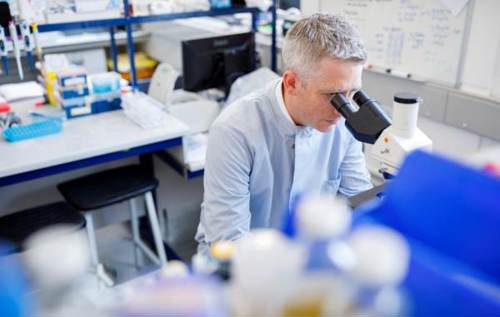How research is helping us understand how diet influences inflammatory arthritis
27 February 2024
 'Why me?'
'Why me?'
'How many people have arthritis?'
'What treatment is out there?'
These are just a few of the many questions you might have asked yourself if you’ve been diagnosed with arthritis.
To answer these questions, we need lots of real-world data. And one way we can get this, is through registers, like the Norfolk Arthritis Register.
Pratyasha Saha is a doctor, rheumatology academic clinical fellow, and researcher at the Norfolk and Norwich University Hospital (NNUH) and the University of East Anglia (UEA).
Here she explains how vital registers are for arthritis research, and how the UEA team are using the Norfolk Arthritis Register (NOAR) to study how diet may influence arthritis.
What is a register?
Registers use real-world research to find out what happens to people with a particular condition over time.
“It includes anonymised data about people’s age, sex, disease outcomes and sometimes blood samples, which can be used by researchers,” explains Pratyasha.
“Unlike clinical trials, which often focus on short-term outcomes, registers can capture information from a wide range of people over a long time. This gives us a better picture of what happens to people with a particular condition.”
What is the Norfolk Arthritis Register?
 We’ve continued to invest in the Norfolk Arthritis Register — and, over the past three decades, it has transformed the way we think about arthritis.
We’ve continued to invest in the Norfolk Arthritis Register — and, over the past three decades, it has transformed the way we think about arthritis.
“The Norfolk Arthritis Register collects information on adults who are newly diagnosed with inflammatory arthritis, such as rheumatoid arthritis or psoriatic arthritis”.
In conditions like these, the immune system, the body's natural defence system, is out of balance and can attack your joints, spine, and sometimes other organs too.
“The aim of the register is to study how different types of arthritis progress, and to find genetic and non-genetic factors that might influence the condition. It studies when people get the disease and how they respond to different treatments.”
“It also aims to find gaps in the care and the treatment of people with arthritis. By understanding these, doctors and researchers can work to improve the quality of care for people with arthritis”
Get involved in our research
What has the Norfolk Arthritis Register achieved?
"The Norfolk Arthritis Register is so important because it’s the only continuous long-term study of early inflammatory arthritis in the UK.”
Pratyasha says the Norfolk Arthritis Register is vital “because it only recruits patients with a new diagnosis of arthritis” and it then follows their journey over a length of time.
“It collects data at an important time of disease development and progression. It then follows patients for up to 20 years, so we can see in detail how the disease progresses.”

Since it began, the Norfolk Arthritis Register has made some ground-breaking discoveries. For instance:
- It was the first study to estimate the number of people who have rheumatoid arthritis and the number of people who developed rheumatoid arthritis over a period of time.
- It showed that there are better outcomes when we treat rheumatoid arthritis earlier.
- It showed the risks associated with arthritis, such as that people with rheumatoid arthritis have an increased risk of cardiovascular disease. This has led to wider and more screening for the condition.
- It has helped us find genes associated with rheumatoid arthritis, which could be future drug targets.
“One of the most important things about the Norfolk Arthritis Register is how patient-focused it is,” says Pratyasha.
On top of clinical data, the register also includes what patients have said about the impact of their condition, and it has a longstanding patient group guiding its research aims.
“This has also helped to identify the social care needs of people with rheumatoid arthritis.”
Discover the latest data and statistics about arthritisHow diet may influence arthritis
Right now, Pratyasha is working in a team led by Professor Alexander MacGregor at the University of East Anglia (UEA).
They are working on a new trailblazing study called DESIGNA, which hopes to understand how diet might influence arthritis.
“There’s so much contradictory information about diet and nutrition, both in the media as well as scientific research,” explains Pratyasha. “There’s a demand for this knowledge but, right now, there’s little information – and this is where DESIGNA comes in.”
“We know that some conditions, such as rheumatoid arthritis, happen because of a mix of genetic and environmental factors.
“Diet is an important non-genetic factor that can lead to certain people developing certain diseases - and unlike some of the other risk factors it [can be changed].”
“We hope the DESIGNA Study will give us a much clearer picture of how diet influences rheumatoid arthritis.”
What does the DESIGNA study hope to do?
The DESIGNA study is looking at metabolites, which are small molecules in our body that are involved in chemical reactions needed for day-to-day life.
“We know that diet influences some of these metabolites,” explains Pratyasha.
“So, if we can understand which metabolites are influenced by diet in people with rheumatoid arthritis, we may find evidence to suggest how particular diets and nutrients might influence the development of arthritis or the worsening of symptoms.”
“It's the first study to look at dietary exposure on metabolites in arthritis in this way.”
To bring the study to life, the team will use data from both the Norfolk Arthritis Register and the EPIC-Norfolk study, another register from the University of Cambridge.
“As a result, we should be able to give more targeted dietary advice and potentially more cost-effective ways to prevent rheumatoid arthritis and the progression of the condition.”
What advice would you give about diet and arthritis today?

There are a lot of myths and misconceptions about diet and arthritis.
Although there are no diets or supplements that will cure your arthritis, some people find that their condition is affected by what they eat, how much they weigh and their physical activity levels.
Pratyasha says she would “naturally encourage anyone to eat healthily because it’s [clear] that it will help your arthritis and have wider health benefits.”
“We would also want to support people to be aware that there may be a relationship with diet and arthritis and to look for patterns in their own experience.
"But we would ask people to be a bit sceptical about claims about certain foods (like tomatoes) or diets and to wait for more sound scientific evidence to come out.
“More funding in high-quality research will hopefully help answer these questions that really do need an answer for our community."
Learn more about eating well with arthritisHow Versus Arthritis is helping shape arthritis research
Right now, we’re the largest charity funder of arthritis research in the UK — and we’re making real progress. But we couldn’t do it without the support of people like you, living with arthritis.
“Without big groups of patients on registers, answering this research question would just not be possible,” says Pratyasha.
She also says it’s a “really exciting time to be a part of research and to provide information that might guide treatment options even within a few years and the future.”
“Patients are the most important part of research and there's lots of ways of getting involved with as much or as little time commitment as you want. There are now ways of getting involved remotely too.”
“Involvement can contribute to better understanding of the condition, its diagnosis and treatments, and ultimately improve quality of care for patients and future patients with arthritis.”